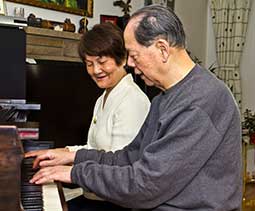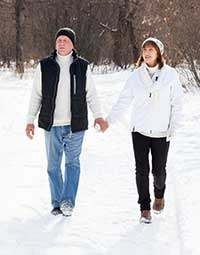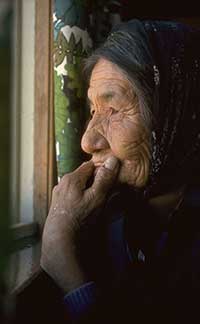Completion requirements
View
Topic Overview

- Bodily changes occur as the result of aging itself, as well as disease and lifestyle.
- As people age, some body systems decline and get slower.
- Certain medical conditions appear differently in an older adult and often affect older people more seriously.
- Lifestyle changes can help slow the aging process and defer the onset of age related problems.
Introduction

- Aging is a gradual process of maturation in which the body undergoes numerous changes. These changes are the result of aging as well as disease and lifestyle.
- People age differently and at varying speeds because of their genetic make-up and their environment, occupation and upbringing.
- Although aging cannot be prevented, adopting a healthy lifestyle can help to slow many age-related changes.
What You Should Know
Healthy Aging Changes
As people grow older, some body systems begin to deteriorate. Here are some of the changes that occur.

- Skin Aging results in the loss of fat layers and oil glands. This causes the skin to become less elastic, and more delicate, wrinkle begin to appear. Aging causes the number of sweat glands and blood vessels to decrease. As a result, older people have more difficulty controlling their temperature.
- Bones With aging, bones become thinner and there is more risk of fracture, especially for women. There is a loss of height by 1 to 3 inches because of changes in the spine. Ligaments lose their elasticity, which causes joints to become less flexible.
- Muscles and Tissues With aging, hormonal changes cause muscle strength to decrease. The amount of body fat increases, which in certain circumstances, can lead to health problems such as cardiovascular disease and diabetes.
- Eyes With aging, it is more difficult to see objects that are near, the lens becomes stiffer, or to see in the dark or in very bright places as changes occur in the retina, the lining in the back of the eye. Depth and contrast perception also decreases. Fewer tears are produced and eyes become drier.
- Ears Higher frequencies of sound become more difficult to hear; sometimes it becomes difficult to differentiate the source of sound un noisy places. Ear wax can accumulate and lead to difficulty hearing.
- Mouth and Nose Smell and taste decrease because there are fewer and less sensitive taste buds. The lining in the nose becomes thinner and drier. The mouth becomes dry more easily. As gums recede, dental cavities and decay become more common.
 Brain
With aging, there are changes in memory function which result in slower thinking and less concentration, particularly when having to concentrate on more than one thing at once. There is often more difficulty learning new tasks. Short term recall becomes
impaired but long term memory and memory of life events remain stable.
Brain
With aging, there are changes in memory function which result in slower thinking and less concentration, particularly when having to concentrate on more than one thing at once. There is often more difficulty learning new tasks. Short term recall becomes
impaired but long term memory and memory of life events remain stable.
- Heart and Lungs With aging, heart muscle become less flexible and the heart works less efficiently. Muscles used for breathing become weaker and less flexible, and there are fewer air sacs in the lungs. These changes cause older people to have a higher risk of pneumonia.
- Abdomen and Kidneys Because of changes in the gut, liver and kidneys, it may take longer for medications to be absorbed into and removed from the body. The capacity of the bladder is reduced and urinary flow rate decreases. In older women, pelvic muscle and bladder sphincter weakness can lead to incontinence. In men, the prostate may become larger leading to urinary retention or incontinence. For both men and women, urinary urgency can become problematic
- Reproductive System (Women) Women produce less oestrogen causing the vagina to become drier and women become more prone to bladder infection.
- Reproductive System (Men) Men produce less testosterone causing a reduction in sex drive and changes to muscle. There is also a reduction in blood flow to the penis and erectile dysfunction becomes more common (this is also affected by vascular disease and diabetes).
Atypical Presentations of illness
Certain medical conditions appear differently in older adults, this is common. These are called atypical presentations. Here are some examples.
In an older adult…
- blood infection can occur without fever.
- pneumonia or any infection may appear as sudden confusion.
- chest pain (angina) may show up as shortness of breath.
- psychological stress may appear as pain or discomfort.
- a heart attack may not cause chest pain, but pain in the abdomen, neck or arm.
- thyroid disease can appear as tiredness, constipation, confusion, depression or agitation.
- depression can appear as appetite loss, stomach problems, constipation, sleeping difficulty, or hyperactivity and anxiety or worry.
Health Promotion
 Health promotion is important for older adults and should ideally
begin in mid life to gain the most benefit. However, there is evidence that it is never too late to start. Lifestyle changes, such as the following, can help to slow the aging process.
Health promotion is important for older adults and should ideally
begin in mid life to gain the most benefit. However, there is evidence that it is never too late to start. Lifestyle changes, such as the following, can help to slow the aging process.
- Stop smoking.
- Drink moderately; don’t binge.
- Get regular exercise - exercise reduces stress, prevents cardiovascular disease and can help preserve mobility and independence. Brisk walking 30 minutes a day is a good start. Weight training increases strength and decreases loss of bone density.
- Remain socially active; this is an important part of keeping mentally active, Make sure you do something mentally challenging each day.
- Get enough sleep. It is a myth that older people need less sleep than younger adults. Make sure that you follow good sleep hygiene practices See http://www.sleepfoundation.org/article/ask-the-expert/sleep-hygiene for more information
- Try to follow a Mediterranean diet and maintain as near normal a body mass index for you as you are able.
- Get a flu shot every year. Ensure your pneumonia vaccine is up to date
- Take calcium (500 mg a day) and vitamin D (1000 - 2000 IU daily) to prevent osteoporosis
- Have an annual check-up with the dentist and ophthalmologist.
- If health problems occur, seek early advice from your family doctor. Women should perform breast self examinations.
- You should ensure that you take part in any health problem screening programme that is offered; catching problems early is usually beneficial.
Last modified: Wednesday, April 27, 2022, 9:21 AM